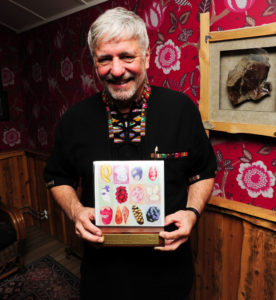The Crop Trust, an international organization that supports crop germplasm conservation, recently honored Dr. David Ellis, the head of the International Potato Center (CIP) Genebank and the leader of CIP’s Program of Conserving Biodiversity for the Future, with a Crop Trust Legacy Award.
The Award was created as part of the Crop Trust’s celebration of the 10th anniversary of the Svalbard Global Seed Vault, located in the arctic archipelago of Svalbard, Norway, which holds the world’s largest collection of crop diversity. Dr. Ellis was one of six scientists from CGIAR Research Centers who were given Crop Trust Legacy Awards in recognition of their contributions to the conservation of global crop diversity. The award ceremony took place in Svalbard on Sunday, February 25.
In the words of Marie Haga, Executive Director of the Crop Trust: “The Crop Trust Legacy Award recipients are the global gatekeepers of crop diversity, having spent decades committed to their belief in the absolute importance of seed conservation.”
 Dr. Ellis is a botanist who has been involved in the preservation of plant genetic resources for his entire professional career. Since taking the helm of the CIP Genebank in 2012, he has overseen an array of innovations that include the development of a cryopreservation system for potato, the construction of largest plant cryopreservation facility and group in the world, and the generation of DNA fingerprints to verify germplasm identity. At the same time, he has strengthened CIP’s partnerships with indigenous communities in Peruvian Andes that conserve potato diversity in situ and organizations around the world dedicated to the preservation of plant genetic resources.
Dr. Ellis is a botanist who has been involved in the preservation of plant genetic resources for his entire professional career. Since taking the helm of the CIP Genebank in 2012, he has overseen an array of innovations that include the development of a cryopreservation system for potato, the construction of largest plant cryopreservation facility and group in the world, and the generation of DNA fingerprints to verify germplasm identity. At the same time, he has strengthened CIP’s partnerships with indigenous communities in Peruvian Andes that conserve potato diversity in situ and organizations around the world dedicated to the preservation of plant genetic resources.
The CIP genebank conserves the world’s largest in vitro collection of potato, sweetpotato and Andean roots and tubers in trust for humanity, with more than 21,000 accessions of cultivated varieties, crop wild relatives and breeding lines available for research and breeding. Under Dr. Ellis’ leadership, the genebank has improved access to information about the germplasm it conserves, and has promoted adoption of a new global information system created under the International Treaty on Plant Genetic Resources for Food and Agriculture.
Dr. Ellis observed that crop diversity constitutes the building blocks for the future, yet it is disappearing on a daily basis. “In the long term, in a genebank, we talk about the next hundred years. What we want is for this material that we have to work with today, this genetic diversity, to be available for our great, great grandchildren,” he said.
